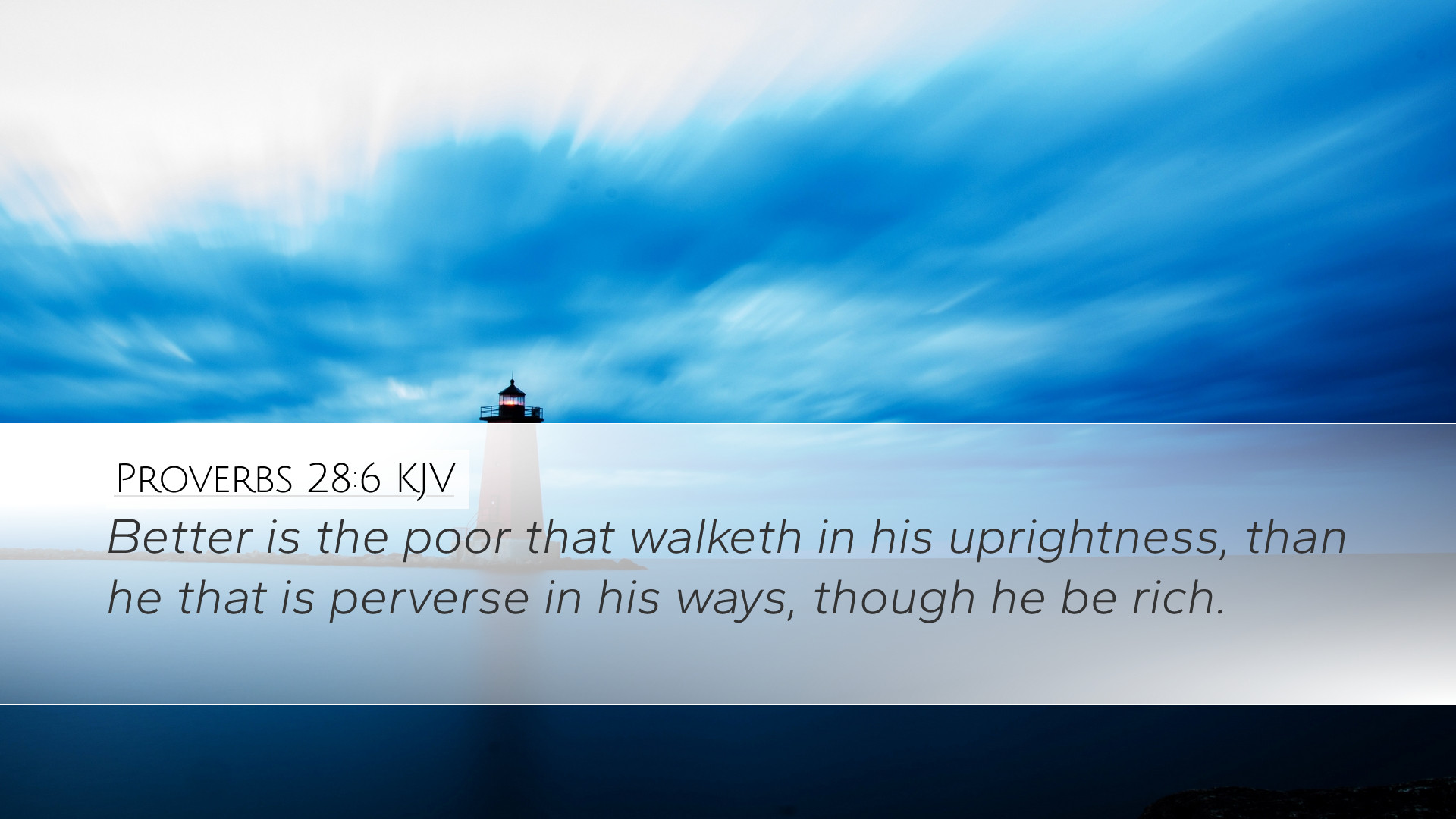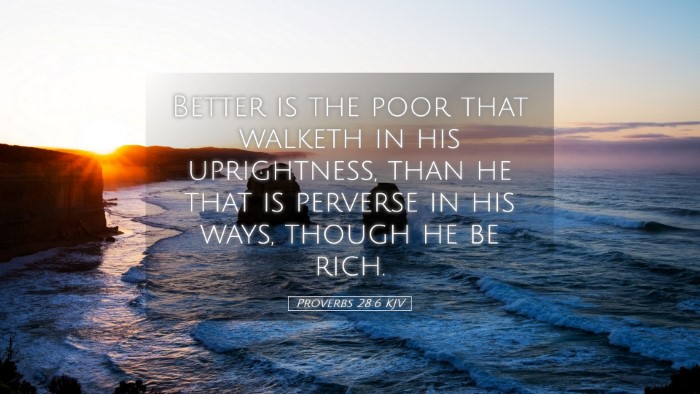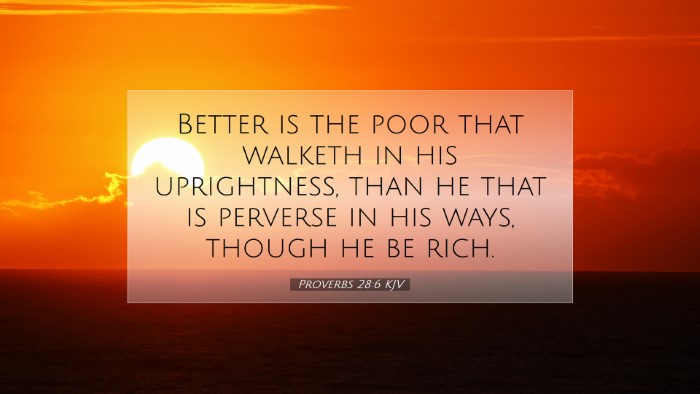Commentary on Proverbs 28:6
Proverbs 28:6 states: "Better is the poor who walks in his integrity than one perverse in his ways, though he be rich."
Introduction
This verse presents a powerful dichotomy between integrity and wealth. It emphasizes the moral superiority of upholding one’s values while being economically disadvantaged compared to the perilous position of a wealthy individual who operates outside of ethical boundaries. This commentary aims to explore the theological, moral, and practical teachings encapsulated in this poignant proverb, drawing from renowned biblical scholars and commentators.
Insights from Matthew Henry
Matthew Henry emphasizes the principle of integrity over wealth in his exegesis of Proverbs 28:6. He articulates that true poverty, accompanied by integrity, is far more commendable than the wealth of the unscrupulous. Henry notes that the poor individual who walks in integrity possesses a wealth of character, which is greatly valued by God. He contrasts this with the fate of the rich who conduct themselves in a corrupt manner, suggesting that their wealth cannot compensate for their moral failings.
- Integrity as a Greater Asset: Henry asserts that integrity brings peace of mind and favor with God, even in the midst of poverty.
- Wealth without Righteousness: He warns that wealth can lead to moral compromise, causing individuals to stray from God's commandments.
- The Value of Righteousness: Within the scope of divine judgment, integrity is paramount, ensuring that those who remain faithful despite economic struggles will be vindicated.
Reflections from Albert Barnes
Albert Barnes highlights the contrast between two types of individuals, focusing on the deeper implications of righteousness in one’s life. He notes that the proverb is not merely a social commentary but rather a theological reflection on the nature of divine favor. Barnes posits that one’s moral conduct has eternal ramifications, far surpassing transient wealth.
- Divine Perspective on Wealth and Poverty: Barnes asserts that God's values differ from worldly estimations. He champions the marginalized poor whose lives resonate with ethical consistency.
- Moral Integrity Defined: From Barnes’ viewpoint, moral integrity encompasses honesty, fidelity, and adherence to God's commands, all of which bolster one's standing before God.
- The Reality of Judgment: Barnes emphasizes the inevitability of divine judgment, where integrity will be rewarded and unrighteousness exposed.
Insights from Adam Clarke
Adam Clarke offers a rich analysis that extends to the idea of wealth as a test of character. Clarke elaborates on the notion that a righteous individual, regardless of their financial status, is blessed by their moral choices, whereas a wealthy individual may find themselves in peril due to their ethical compromises.
- The Poor and Integrity: Clarke underscores the emotional and spiritual wealth that arises from living a life of integrity, arguing that this is invaluable in the eyes of God.
- Consequences of Ethical Breaches: He warns of the spiritual and social costs associated with unethical conduct while in possession of wealth.
- Final Reflection: Clarke concludes with a reminder that earthly riches are fleeting, whereas virtuous living has enduring significance and rewards.
Theological Application
The theological implications of Proverbs 28:6 extend to various aspects of Christian doctrine. This verse serves as a poignant reminder of the divine principles governing ethics and morality. It calls believers to reflect on their values in light of God's character. Integrity is not merely a personal virtue; it embodies a commitment to the truth and reflects one’s relationship with God.
- Promise of God’s Provision: The faithful believer, irrespective of material status, holds the promise of God's sustaining presence and provision.
- Challenge of Wealth: For those who are wealthy, there lies a spiritual challenge to navigate success without compromising one's moral and ethical standards.
- Call to Integrity: Both the impoverished and affluent are called to a higher standard of living that reflects their devotion to God and His teachings.
Practical Considerations
Proverbs 28:6 has practical implications for both individuals and communities. It encourages introspection about one’s priorities and the authenticity of one’s actions. For pastors and church leaders, this verse serves as a foundational principle for discipleship, emphasizing the importance of character over possessions.
- Poverty and Integrity in Ministry: Pastors can draw upon this principle to support those in their congregations who may struggle financially but are steadfast in integrity.
- Ethical Leadership: Leaders in various spheres need to embody integrity, setting an example that aligns with scriptural teachings, thereby fostering communities that value ethical behavior over profit.
- Community Support: Congregations can develop initiatives that help those in need, reinforcing the belief that character and community are paramount over wealth.
Conclusion
Proverbs 28:6 encapsulates profound truths regarding the nature of wealth, integrity, and divine favor. The commentaries of Matthew Henry, Albert Barnes, and Adam Clarke reinforce the timeless relevance of this proverb, urging believers to evaluate their lives through the lens of God’s moral order. As we seek to apply these teachings, let us prioritize integrity, embrace the moral calling of the Gospel, and remember that true richness is found in righteousness and a steadfast walk with the Lord.


